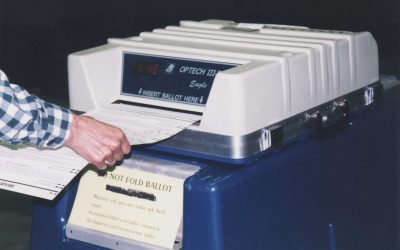Speak Like a Voter, Win Like a Candidate
Are you watching your language? I’m talking about the language of your campaign as you reach out to voters. In your advertising, speeches, and one-to-one interactions, are you conversing with or talking down to your audience?
How do you talk down to an audience? By speaking above them. For example, it’s tempting to sprinkle your messages with political jargon. After all, as a candidate, you’re likely steeped in the lingo and acronyms of the various policies and regulations related to your platform.
And while you might know the ins and outs of these terms, many voters may have no idea what you’re talking about.
The same thing applies when you’re talking about topics that are not widely known. For example, we worked with a local candidate who liked to reference things about other officials in her campaign material. The problem was, she was referencing upcoming projects and backroom deals that were not common knowledge to the public and voters at large. Reading this material without context made her statements seem like ramblings. It certainly didn’t help her messaging.
Here’s the thing: clarity wins campaigns
Voters want to feel connected to your cause. When they hear complex language or jargon from a candidate, they might feel alienated. Instead of speaking to them, you’re speaking above them.
“The words that come direct from the people are the greatest… If you substitute one out of your own vocabulary, it disappears before your eyes.” – Dorothea Lange
Here’s an example of being too complicated: A candidate for city council (who was a lawyer) mentioned the term “fiscal rectitude” on his website’s issues page. Sounds impressive, right?
Well, it sounds like it might go over most voters’ heads.
But instead of the phrase “fiscal rectitude,” what if he switched to “managing the budget wisely”? Will that message hit home with more voters? Absolutely. Will it be more effective? Without a doubt.
Or what about a local candidate who frequently mentions “Home Rule” when discussing housing standards. To the uninitiated, this term might sound complex or overly technical. (Or maybe it’s a baseball term?)
But what if, instead of “Home Rule,” the candidate explained it as “giving our city the power to make its own rules for our unique needs”? Suddenly, the concept becomes clearer and more relatable. That’s the type of quote you can use on a web page, with a pull quote or simple graphic.
The key takeaway? Your messaging is not a platform for showcasing political lingo or an extensive vocabulary.

Five Tips to Simplify Your Political Communication
Use Plain Language: Replace complex jargon and acronyms with straightforward, simple language that everyone understands.
Explain Terms Clearly: When you must use specific terms, immediately follow them with a clear, concise explanation.
Be Direct and Concise: Cut down on wordiness and quickly get to the point.
Use Relatable Examples and Stories: Incorporate stories or examples that illustrate your points and resonate emotionally with voters. A story about a local resident affected by your policies can be more effective than abstract statistics.
Engage and Interact: Invite others to share their thoughts and experiences related to the campaign topics discussed.
Make every word count
If the above examples were not enough, here are more ways to make sure your messaging is clear across all your campaign platforms.
- Cut the Complexity: Instead of saying, “We advocate for increasing public education funding,” try “We believe in more money for schools.” It’s direct, simple, and leaves no room for misunderstanding.
- Break It Down: Turn “our strategy includes multifaceted approaches to curb urban sprawl” into “we have a plan to keep our city’s growth smart and managed.”
- Keep It Relatable: Change “promoting sustainability initiatives to mitigate climate change impacts” to “Let’s work together to make our planet greener.”
- Straight to the Point: Instead of “Engagement in civic activities is paramount,” go for “Get involved. Your voice matters.” Short, impactful messages win on social media.
- Stories Stick: Don’t bombard listeners with data. Nobody’s going to remember numbers and statistics. Instead, share a relatable story about a single mom who benefits from your healthcare policy. It’s personal, memorable, and has a happy ending that ties into your efforts.
- Highlight the Real-World Impact: Say “Fix our roads for safer travels” or “Help us clean up our streets. Join us!” This quickly connects with the readers everyday lives and concerns.
Simplifying your language isn’t about dumbing down your messaging. With a more direct and personal approach, you come across as if you are engaging in a conversation rather than giving a lecture.
And nobody likes being lectured to.
Your success hinges on making every voter feel seen and heard. So, strip away the complexity and just speak the language of your voters.
It’s that simple!
Online Candidate provides affordable campaign websites, with campaigning tools and resources included. Get started today!
Creating a Political Campaign Timeline
If you’ve ever run for local office, then you know that the stakes are high, no matter the position. And the competition can be as tough as any state or federal race.
Planning out a timeline for your political campaign is an important step in winning. Knowing when to do things and what needs to be done helps make the most of your limited time, money, and resources.
Stay on track and avoid becoming overwhelmed by creating a campaign calendar that includes specific goals and milestones that reflect your campaign strategies.
Below is an example timeline for a local office race, such as city council. Use this schedule as a guideline for planning out your political calendar. Customize the template below to your specific needs.
Note: If you’re running for a state representative or federal office, you’ll want to start the campaigning process at least 18 months before the election.
A sample political campaign timeline
6-9 months before the election:
- Research potential elected positions, and decide whether to run.
- Research and identify key campaign issues and develop policy positions.
- Develop an issue platform and begin building a campaign team.
- Establish a campaign account and begin ongoing fundraising efforts.
- File paperwork to become a candidate and make your announcement.
- Start attending local community events and meetings. Start or continue building relationships with community leaders.
- Conduct a voter analysis and identify the key demographics of your constituency.
5-6 months before the election:
- Conduct a competitor analysis to understand other candidates running for the same elected position.
- Develop and launch your campaign website, social media pages, and other marketing materials.
- Establish a volunteer network and create a phone banking and canvassing program.
- Set fundraising goals and develop a donor outreach strategy.
- Conduct focus groups or surveys to gather insights from potential voters.
- If you are not doing so already, start attending and speaking at local events. This can include local town halls and community meetings.
3-4 months before the election:
- Continue fundraising efforts, with a focus on small, local donations.
- Plan out and get started with your door-to-door canvassing efforts.
- Attend candidate forums and debates.
- Develop a media relations strategy to proactively engage with local media outlets.
- Identify and reach out to potential endorsements from influential individuals or organizations.
2 months before the election:
- Plan and hold events to build momentum.
- Continue door-to-door canvassing, calls, and phone banking efforts.
- Develop a poll monitoring plan for election day.
30 days before Election Day:
- Finalize your messaging and materials for your last mailings.
- Launch social media and online advertising ads to target key voter demographics.
- Conduct a volunteer recruitment drive to increase coverage for canvassing and phone banking.
- Schedule and participate in candidate forums and debates.
- Coordinate and execute a targeted direct mail campaign to reach specific voter segments.
- Engage with local unions, community organizations, and interest groups to secure endorsements.
21 days before Election Day:
- Begin early voting outreach and encourage supporters to vote early. (Depending on early voting dates.)
- Plan some larger public events, such as a rallies, to build momentum and visibility.
- Implement a digital advertising campaign to increase online visibility and target undecided voters.
- Launch a direct mail campaign to targeted voters.
14 days Before Election Day:
- Ramp up door-to-door canvassing efforts, targeting undecided and independent voters.
- Host a final meet-and-greet event for supporters. Try to raise money for a final advertising push.
- Conduct phone banking to encourage early voting and identify potential supporters.
- Put together and execute a radio and/or TV advertising campaign to reach a broader audience.
- Conduct a series of candidate interviews with local media outlets to amplify campaign messaging.
7 days before Election Day:
- Ramp up get-out-the-vote canvassing and phone banking. Target registered voters who have not yet voted.
- Host a final public event, such as a town hall or meet-the-candidate event.
- Organize a “Get Out the Vote” rally to energize supporters and encourage voter turnout.
- Send out final email and text message reminders to supporters and potential voters.
- Establish a voter hotline or helpline to address any issues or concerns on Election Day.
Election Day:
- Ensure all get-out-the-vote and poll monitoring efforts are in full force.
- Deploy volunteers to monitor polling places and report any irregularities or voter suppression.
- Watch the election results as they come in.
Election Night and Post-election:
- Monitor the certification of election results by local authorities.
- Thank your volunteers and supporters for their efforts.
- Make concession or victory speech.
- Develop a post-election communication plan to stay connected with supporters and maintain momentum.
1 Week After Election Day:
- Engage with the community and establish relationships with newly-elected officials, if applicable.
- Identify and engage with key stakeholders to help achieve your policy goals, if applicable.
- Host a post-election event to thank supporters in person.
- Conduct a post-election analysis to evaluate the campaign’s strengths and areas for improvement.
- Begin the process of building coalitions and alliances with other elected officials for future policy goals.
2-4 Weeks After Election Day:
- Continue outreach efforts to newly-elected officials or continue to engage with the community to continue building relationships.
- Finalize any legal challenges or other post-election activities.
- Review and reconcile all financial records.
- Cancel any ongoing services or expenses.
- Evaluate the effectiveness of the campaign and identify areas for improvement.
- Create a comprehensive campaign report to document lessons learned and share with the campaign team.
- Consider your next steps, such as maintaining your volunteer network and continuing your fundraising efforts for any future campaigns.

As you start to put together your calendar, check with your local board of elections. They can provide you with additional important dates to know, such as:
- Candidate Filing Deadline: The deadline for candidates to submit their application and required paperwork to appear on the ballot.
- Primary Election Day: When political parties select their candidate or candidates to run in the general election.
- Voter Registration Deadline: Use this time to increase registered voters before the election. Make sure your supporters know the cutoff time.
- Early Voting Period: Be sure to tell supporters when they can cast their ballot in person before the official election day.
- Deadline for Absentee Voting: This is the last day that voters can either request or submit an absentee ballot.
- Deadline for Submitting Absentee Ballots: You’ll want to remind voters when they must submit their completed absentee ballot.
- Campaign Finance Reporting Deadlines: You’ll need to know when to submit reports on contributions and expenses.
- Don’t forget Candidate Debates or Forums: These events may be planned by outside parties. They provide an opportunity to communicate a candidates’ positions and directly engage with voters.
As you start your timeline of the political campaign process, it’s important to know when these important events occur so you can incorporate them into your overall strategy.
You can expect all sorts complications in the months and weeks leading up to the election. Always remain flexible, and keep your team up to date on what’s happening next.
Frequently Asked Questions
How far in advance should I start planning my campaign calendar?
Start planning your campaign calendar at least 6-9 months before the election. This allows you plenty of time to research, strategize, and lay out a comprehensive timeline that aligns with your campaign goals.
How do I prioritize and allocate time for different campaign activities in the calendar?
Prioritizing and allocating time for campaign activities depends on their significance and impact on your overall strategy. Focus on activities that directly contribute to voter outreach, fundraising, and messaging. Allocate time based on their relative importance and consider any dependencies or deadlines involved.
What factors should I consider when determining the duration of each phase in the campaign timeline?
When determining the duration of each phase, consider factors such as the intensity of voter engagement needed, fundraising goals, the timeline for early voting, and the overall length of the campaign cycle. Giving yourself enough time for effective voter outreach and fundraising efforts while also allowing for adjustments and unforeseen circumstances.
How can I effectively balance fundraising efforts with other campaign activities in the calendar?
Balancing fundraising efforts with other campaign activities requires careful planning and integration. Allocate specific time slots for donor outreach and fundraising events in your calendar. Additionally, consider leveraging key campaign events to maximize fundraising opportunities and incorporate fundraising goals into your overall campaign strategy. Remember, maintaining a healthy balance ensures the financial resources necessary to support your campaign activities.
How do I adjust a campaign calendar in response to unforeseen events or changing circumstances?
To adjust a campaign calendar in response to unforeseen events or changing circumstances, start by assessing the impact on your existing timeline. Flexibility is required, and you may need to reschedule, shift, or add tasks to adapt to the evolving landscape.
Remember to stay agile and prioritize based on urgency and importance. Communicate changes to your team promptly, ensuring everyone is on the same page. Maintain your goals and be creative in finding alternative ways to reach them if you have to. Adapting your campaign calendar allows you to navigate unexpected twists and turns while staying focused on your ultimate objective – winning the election!
Start your digital presence with Online Candidate. We offer a range of services, from our $29/Month Builder Option to our Enhanced Website Package where we handle the full design and site setup.
Related:
Campaign download worksheets and spreadsheets (OnlineCandidateResources.com)
Will Your Social Media Past Hurt Your Political Future?
Do you currently maintain a Facebook or Twitter account? Do you have an ancient MySpace page archived somewhere out there? Did you ever post comments on online forums under your own name? If you’ve ever done these things, then you’ve left behind information that could hurt you when you run for political office.
Young people tend to be more willing to share their lives online. Those free-wheeling kids now find themselves dealing with the consequences of their previous online lives. More and more candidates today are dealing with old digital material coming back to haunt them.
Racy photos, crazy party shots, video clips, and off-the-cuff comments on social media profiles can persist for years. When these digital artifacts are ‘discovered’, a political opponent can use them out of context (or even in context, as the case may be). This can leave candidates confronting a sticky issue.
No amount of detergent can provide a digital scrubbing
Deleting online pages or accounts won’t make the information go away. A saved screen shot, a digital photograph on a hard drive, or even an archived page on Wayback.org can still exist somewhere, waiting to pop up again. Trying to delete profiles and files after they are discovered can only inflame the issue and make it seem like a candidate is trying to hide something.
Too much reliance on the privacy controls in a user’s account can give them a false sense of control. Use this rule of thumb: Consider that anything that you post online will eventually be made public and could be used against you by a political opponent. If you are not comfortable with anyone now or in the future seeing certain material about you, then do not post it online.
Of course, that doesn’t prevent other people from posting about you online. In this age of viral video, you will want to keep the same rule of thumb about anything you do or say in public. After all, you don’t want to have a “Maccaca moment.”
Keep your social media clean going forward
There are candidates who have been able to say and do outrageous things on social media and still get elected. But that technique will probably not work for you. Politicians’ online behavior has been drawing more attention lately. In some cases, the consequences have been disastrous.
Some recent examples include:
- A man who ran for St. Paul City Council and posted a topless picture of his wife online while running for the city’s Ward seat avoided more jail time when he was sentenced.
- A staff member at the Kansas Department of Transportation was fired because of partisan tweets, and a governor’s nominee for the Kansas Court of Appeals quit because of them.
- A former Democrat who sent explicit texts to a 15-year-old girl has just been let out of prison after having served 21 months.
- Five candidates resigned after screenshots of racist, homophobic, and other offensive comments came to light.
Confront the situation and move on
Be proactive where you can. Clean up your online presence before you announce your run for office.
There’s no sense in becoming paranoid about what hidden information may exist about you online. What’s out there is out there, and there’s no getting around it. Anything you post going forward should be reflective of you as a candidate. That might mean cleaning up slang or colloquial phrasing in posts or updating your profile images to something more dignified.
You don’t have to change who you are, but be aware of how you present yourself to a potential voter.
If there is embarrassing material about you online, it will probably be discovered. In the end, it’s best to simply confront the material and move on to more important issues.
Start combing through those Facebook and Twitter accounts!
Online Candidate clients can access our resources on cleaning up and building an online reputation. Ready to start your own online campaign? We have four website packages to get your site built quickly and easily.
The Candidate Statement: Communicating Your Vision to Voters
Who are you to voters? At the start of an election campaign, political candidates outline their positions on various issues. These are called candidate statements, and they are used to help voters make informed choices. In this article, we will explore what a memorable candidate statement is and the key elements you need to write one.
Let’s start with the most obvious question:
What is a candidate statement?
A candidate statement is an outline of a political candidate’s qualifications. It summarizes their positions on key issues, and their plans for the future. It’s more like a stump speech, as a statement is designed to be straight to the point, and connect with voters on a personal level.
Think of it as a voter introduction.
Versions of this information may be eventually reworked and included in voter information guides, campaign websites, and brochure material.

Writing a candidate statement isn’t as hard as you think.
Elements of a Candidate Statement
When writing a candidate statement, the final result should easily provide voters with an understanding of the candidate’s background, platform, and vision. Just like a candidate’s personal bio, your statement should be concise and highlight your unique skills and values.
An effective candidate statement should include the following elements:
Introduce yourself and provide your background
Your introduction should be concise and clear. It should outline who you are and what office you are running for. Then go into a short background description, while highlighting your unique qualifications for the elected position.
For example, you can mention how growing up in the local area gives you a unique perspective on how you can help improve the lives of residents today.
For example, you could say something like. “I was fortunate to have grown up in our vibrant community. It’s this very upbringing that instilled in me the values and understanding that make me qualified for mayor. My roots in this area have given me insight into the challenges we face, as well as the opportunities that lie ahead.”
Lean in on your experience and skills
The background section should be all about your education, work experience, and other relevant accomplishments. Provide context so voters can better understand how your experience and skills directly relate to the position you seek.
For example, suppose you are running for sheriff of a county, and an important election issue is that of community policing. You have a law enforcement background and worked as a community outreach officer. This makes you well-qualified to address the issue. So, when drafting your candidate statement, you might highlight your specific qualifications, such as:
- Graduated with honors from a police academy.
- Served as a community outreach officer and earned a trusted reputation acting as a liaison between the community and law enforcement.
- Led successful initiatives that focused on officer training and building relationships with community leaders.
By focusing on these qualifications, you’ll show voters that you have the experience and skills to handle the role of community policing.
Describe the issues and your platform
This section is perhaps the most important, as it is where you outline your positions on the issues. Highlight the most pressing issues that your voters are facing. Break down your platform into a concise, informed, and well-organized summary. For each issue, provide details on policy solutions or initiatives that you plan to implement if elected.
Wrap it up with a call to action
Finally, finish up with a summary of your main points. And don’t forget to add a clear call to action. Typically, this will be a request for your audience to support the campaign, to donate, volunteer, or get involved in some other way. Deliver your conclusion with confidence and conviction, so you leave a strong impression on the audience.
“Our community is at a crossroads. We have challenges, but also opportunities. We have to work together to make a difference. To do that, I need your support this November. Only then can we shape a better future for our city.”
Preparing for your audience
Before you start writing your statement, you’ll need to do some research and preparation. Here are key elements of this process:
- Research: Before writing a candidate statement, it’s important to research the issues and concerns that are most important to the electorate or audience. This can involve focus groups, researching polling data, and finding out more about your opponent’s stances.
- Writing: Once the research is complete, you or your team will begin the writing process. Again, what you say should be concise and easy to understand. It should include a clear message that reflects your vision for the future. You will end up creating several versions, as your material should be tailored to each specific audience you present to. This may determine whether you mention specific endorsements or organizations that you belong to.
- Editing: Once the writing is done, it’s time to edit and refine the material. This may involve cutting out unnecessary information, adding additional detail, or rephrasing certain sections for clarity or impact. Carefully review your text to ensure that it is free of errors. Make sure that it effectively communicates your message.
- Rehearsal: After your statement is written, it’s time to rehearse the speech. You should do it enough so you are comfortable delivering it in a public forum. You may want to practice in front of a mirror, record yourself on video, or deliver your speech to a few trusted supporters or advisors for feedback. The more you practice, the more comfortable you’ll be speaking before an audience.
Conclusion
Overall, a well-crafted candidate statement can make a big difference in your political campaign. It can help establish credibility and build support for your election.
Recommended Reading: Political Candidate Profile and Biography Worksheet [PDF]
How to Build a Winning Political Campaign Team
Putting together an effective political campaign team is one of the most important steps a candidate can take. It doesn’t matter if you’re running for city council or Congress—no one runs a successful campaign alone.
A proper political campaign structure allows for division of labor and delegation of key responsibilities. This frees up the candidate to focus on voter outreach, fundraising, and refining the campaign message. Meanwhile, others can manage operations, logistics, and strategy behind the scenes.
Put together key political staff positions
Recruiting key staff members is important when running for office. Each member should be selected based on their skill set, campaign experience, and ability to operate under pressure. Here’s who to look for:
Campaign manager – a critical member of the team
The role of the campaign manager is critical to success, as they take charge of all campaign-related activities. They serve as the main point of contact between the candidate, staff, volunteers, and outside consultants. In smaller campaigns, they may be the only paid staff member. Finding the right person for this role is critical.
Note: Candidates should NOT act as their own campaign manager. We’ve seen it happen too often when a candidate takes on too many roles and becomes overwhelmed. In the end, they are not left with enough time to do the activities that a candidate should perform, such as voter outreach, personal contact with donors, etc.
Campaign treasurer
This is the person in charge of the campaign’s financial and accounting operations. The job involves approving expenditures, creating and maintaining a budget, tracking contributions, and making sure that the campaign operates within the bounds of election laws and regulations. Ideally, this person has a background in accounting or finance and is familiar with state and federal election laws. Most jurisdictions legally require naming a campaign treasurer before accepting or spending funds.
Field director
A field director is responsible for overseeing and managing the direct voter outreach. This includes organizing door-to-door canvassing, managing phone banks, and coordinating voter registration drives. They also play a crucial role in the final Get Out the Vote (GOTV) operations, making sure that voters are motivated to head to the polls on election day. A field director should have experience organizing and managing volunteer teams, as well as a deep understanding of the political landscape and voting demographics.
Communications director
The communications director handles media relations, messaging, and public appearances. This includes press releases, speech prep, media bookings, and social media coordination. Strong writing and speaking skills are essential, along with the ability to control the campaign’s public narrative.
Fundraising director
A fundraising director is responsible for overseeing fundraising efforts. They identify and contact donors, plan fundraising events, and ensure financial compliance. This person plays a crucial role in raising donations. Strong networking skills, organizational skills and an understanding of the political landscape are needed. This person should be highly organized, have strong networking skills, and understand both the legal rules and the realities of political fundraising.
Political director
A political director oversees the campaign’s political operations, including building relationships with key stakeholders, and developing and executing a political strategy. Your political director should have a deep understanding of the political landscape and experience building and maintaining various relationships. They must also keep on top of identifying key trends and issues, and to help develop effective tactics for the candidate to deal with them.
Digital director
The digital director manages the campaign’s online presence. They oversee the website, email marketing, online ads, online fundraising tools, texting campaigns, and social media platforms. Even small campaigns should have someone focused on digital outreach.
Note: Make sure that more than one person is able to maintain your digital presence. We’ve seen candidates lose their social media expert in the middle of the campaign and be unable to access Facebook or Twitter accounts.
Volunteer coordinators
These people manage volunteers and ensures their activities run smoothly. They often work under and answer to the field director. Volunteer coordinators should be able to work well with others and keep individuals and groups well organized. Volunteers perform all sorts of tasks. They include neighborhood canvassing, operating phone banks, putting up signs and posters, working at events and more.
If you’re running for a larger or more competitive office, such as district attorney, county executive, or state representative, it may make sense to bring on professional consultants or experienced volunteer coordinators early in the campaign. Paid consultants are typically used in larger campaigns for specific tasks. These include political strategy, advertising efforts, managing field operations, and more.
A campaign team is only as good as the people who staff it.
Where to find your team members
For smaller offices like town council or school board, you might start with a few key people and scale up. Larger campaigns for offices like mayor, sheriff, or state senate will need more specialized staff from the beginning. If you’re wondering where to find qualified team members, start with these sources:
- Personal Network: Campaign team members can often be found among the people you know. This includes friends, family, acquaintances, and former colleagues.
- Professional Organizations: Professional organizations such as the American Association of Political Consultants are great places to search.
- Online Job Boards: Online job boards such as LinkedIn, Indeed, and even Monster can be great resources for finding qualified staff.
- Political Parties: Political parties are often a great source of campaign staff. Reach out to your local political party or organization and see if they have any recommendations or connections.
- Campaign Training Programs: Campaign training programs, such as the Campaign School at Yale University and Dare to Run, can be great places to find experienced campaign staff.
- Your Volunteer Pool: Starting with volunteers can be a great way to find dedicated and passionate campaign staff. Many successful team members begin as volunteers and work their way up to become key staff members.
Recruiting and Managing Campaign Volunteers
A successful campaign structure needs more than staff—it needs committed volunteers. Start by reaching out to your existing supporters via email, social media, and events. Make it easy for people to sign up and get involved. Once they do, follow up quickly and plug them into meaningful tasks.
Tips for Managing Campaign Volunteers:
- Assign a volunteer coordinator early in the process.
- Provide basic training for tasks like canvassing, phone banking, or event setup.
- Set expectations for hours, responsibilities, and behavior.
- Keep in touch through a clear communication plan—email, phone, or group chat.
Give volunteers regular updates, thank them often, and remind them that their efforts matter.
Onboarding New Team Members
An effective onboarding process is a key factor in having a well-managed team. This process should include introducing new team members to each other. It should provide an overview of the campaign platform and behavior expectations. And when they start, everyone should have the resources they need to do their jobs.
Onboarding should also be tailored to the individual’s specific needs. For example, a new field organizer may require more extensive training on voter outreach and mobilization. A new data analyst may need in-depth training on the campaign’s data analysis tools.
By taking the time to properly train and onboard your volunteers, it will help ensure that everyone is properly prepared for their roles.
Develop a clear division of responsibilities
To develop a clear division of responsibilities, the campaign manager or team leader should take the following steps:
- Assess strengths and weaknesses: Assess the skills and experience of each team member and determine what tasks and responsibilities would be a good fit for each person.
- Create a task list: A comprehensive list of tasks and responsibilities should be created for each position.
- Assign tasks and responsibilities: Each member should be assigned specific tasks and responsibilities based on their strengths and experience.
- Communicate the division of responsibilities: Each team member should know what is expected of them and of others, so there is no confusion in their role or position.
We’ve worked in campaigns where a team manager did not communicate effectively with the candidate and volunteers. This led to misunderstandings that caused volunteers to quit. Once this happened just before a yard sign delivery run, and it delayed putting out signage by several days.
When everyone knows what they are to do, they can focus on their specified tasks. This can help prevent burnout and ensure that everyone stays on track with their short- and long-term goals.
Conclusion
Building your political campaign team is one of the most important steps you’ll take as a candidate. Choose people who are capable, trustworthy, and committed to the cause. Give them the tools and guidance they need—and let them do their jobs.
You don’t have to do this alone—and you shouldn’t.
Need help launching your campaign website? With Online Candidate, you can get a custom political website up quickly, complete with donation tools, contact forms, and more.
Start strong and stay organized—your team (and your voters) will thank you.
Tips for Writing Your Political Candidate Biography
Anyone running for office needs to write a political candidate biography. A good story adds a personal touch to your campaign. It provides information about your background, qualifications, and your positions on important issues.
Your candidate biography is a profile about yourself. It’s where you introduce yourself as a political candidate and persuade voters that you are not only on the right side of the issues but also the right person for the elected position. Your bio should provide both a compelling story and an interesting read. Done properly, it will help establish credibility and legitimacy, which are important in convincing voters to support you.
If you want to learn how to write a solid political profile or candidate statement, read on!
How to introduce yourself as a political candidate
Who are you? Begin with some background information about yourself. Try to include some qualities that separate you from your opposition. Keep your political bio positive and touch on some issues that are of concern to voters.
[bctt tweet=”Your candidate biography should provide a compelling story and be an interesting read. via @onlinecandidate”]
Describe your personal experience
What experiences in your personal, professional, or within a member organization have helped shape you and made you the person you are today? Discuss your education, job titles, community and civic work, awards, and other offices you’ve held. How do those experiences translate into you being the best and most qualified candidate?
Don’t just create a laundry list of accomplishments, but work your experience into a larger narrative. You control the narrative, so make your biography statements informative, interesting, and educational.
 Add relevant details about yourself
Add relevant details about yourself
A little bit about you personally goes a long way. Voters want to know about you, but maybe not every detail of your life. Include photos or even video from member organization events or initiatives you’ve been a part of. Both personal and professional content helps provide a rounded idea of who you are. It’s a bit like writing an autobiography, but just using the good stuff.
Include any endorsements you’ve secured. Have you won awards or been recognized by community organizations? Use those outside sources to help sell you on your desired position or office. It’s easy to say great things about yourself, but when others do it, that carries a lot more weight.
What is it that you want to accomplish in office?
What do you want to accomplish during your time in office? Perhaps your goals can relate to previous accomplishments in your life. Use specific examples in your profile. Take a situation, describe how you effectively handled it, and use it as a template for this section.
- Take a stand on your most important issue and expand on it.
- What are your solutions or plans for tackling the issue?
- How do your plans differ from those of your opponent or from the way the issue is being handled currently?
Even more importantly, what’s in it for the voter? For example, how will your policies make a difference in the community and the lives of the voters? What will inspire people to join and support your cause? Be detailed in your initiatives and spell out how they relate to the voter.
Easy to start, easy to use. Hosting and domain included.
Sign up now and start your campaign website in minutes.
What makes you the right person for the elected position?
This is where it all comes together. A political biography does not have to be particularly long. 400-500 words should be long enough to get the major points across. Here are some questions you should answer:
- You know the issues, and you have the background, but what makes you the right person for the job?
- How does your experience relate to the elected position? Have you worked with organizations or other government entities?
- What skills can you apply toward your goals? Showcase personal, organizational, or professional skills that will help you perform your duties.
- Back up your claims. This is a good place to reveal endorsements from community organizations or influential people. Have you won awards or professional achievements?
End your candidate statement on a strong note
Finish your candidate election biography with a strong statement about your purpose for running and what you hope to accomplish in the office you seek. Be inspirational in your summary. Be specific about the issues you hope to tackle. Leave the reader knowing that you deserve their vote on Election Day.
Find sample biography examples at OnlineCandidateResources.com.
First or third person presentation for the web?
Some candidates prefer to write their bios in the third person, others in the first. While the first person may come across as more personal, that format is not very useful if you are trying to optimize your content for the search engines. Google doesn’t know who “I” and “me” are. Writing in the third person gives your candidate statement plenty of opportunity to use your full name, which can help the material appear in search engine results for people searching for your name.
Candidate video presentation
A written bio can be translated into video. Many candidates create an introduction video, speaking directly to voters about their vision for the office, who they are, and why they want to represent the people. Videos can be added to their website and shared on social media accounts including Facebook, Instagram, YouTube, and even segments on TikTok.
Another example is a replay of a “meet the candidate” event, where the video includes your introduction and some questions and answers that help tell your story. This video should be edited to make it more concise.
Have your candidate’s biography proofread
Have others you trust read drafts of all your site content to check for grammar, spelling, and content. Others will see your work with fresh eyes and will be able to provide valuable feedback.

Break your bio down for your elevator pitch
Now that you have written a full candidate biography, it’s time to break it down. You should create a concise version for your “elevator pitch”. An elevator pitch is a short description of yourself that explains who you are so that a listener will learn the basics about you very quickly. It should be no longer than 20 to 30 seconds long. It should basically state who you are and what you want to do.
You can also take written sections of your bio and rework them for use in other campaign materials, such as brochures, flyers, mailings, and your website’s media kit. You will even want to incorporate elements into your speeches and public presentations.
These steps will help you write a great campaign biography. A strong candidate statement is the cornerstone of informing the voting public of your background, beliefs, and goals.
Now, get writing!
Recommended Reading: Political Candidate Profile and Biography Worksheet [PDF]









 Add relevant details about yourself
Add relevant details about yourself

